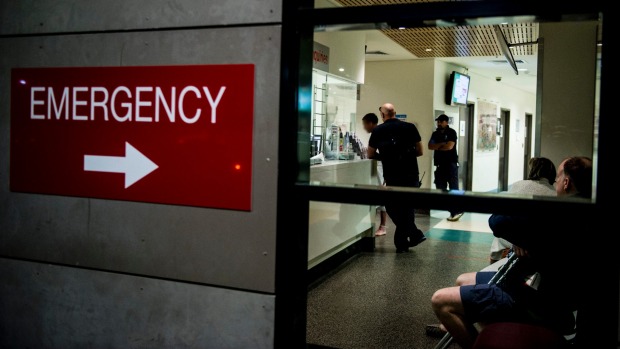
When Calvary Public Hospital chief executive Ray Dennis resigned in August 2014 he cited the development of “a true collaborative partnership between ourselves and the ACT government” as one of the highlights of his nearly 5½ years in the job. This piece of boilerplate now appears eerily prophetic after Friday’s ACT Audit Office report on the hospital’s financial affairs and its relationship with the ACT government.
The audit found Calvary Health Care staff and executives had engaged in “inappropriate financial practices” in 2013-14, including falsely reporting the receipt of $8.89 million in ACT government funding so as to disguise a $9.5 million loss. ACT Auditor-General Maxine Cooper said the fiddling of financial arrangements under the Calvary Network Agreement were improbable and should have been picked up earlier.
It’s not known for certain when Calvary’s financial “performance” came to the ACT government’s attention, but it seems to have been on or about the time of Mr Dennis’ resignation. That’s when the Health Directorate’s director-general wrote to Dr Cooper’s office outlining concerns about financial and performance reporting. The government was almost certainly in the loop when Calvary’s chief financial officer, Wayne Armistead, resigned a month later.
Yet, on October 10, when Calvary announced a $4.9 million loss (attributed to a budget overrun), then chief minister Katy Gallagher was reported to be confident that the steps taken by the Little Company of Mary Healthcare (which runs Calvary) to investigate were appropriate. LCM Healthcare’s national chief executive, Mark Doran, was also of the view that it was a minor hiccup, telling media that Calvary’s partnership with the government and its relationship with ACT Health remained strong.
The irregularities at Calvary resulted in no direct financial loss to the government, nor were funds misappropriated. But in obscuring its true financial picture the hospital was plainly motivated by a desire not to jeopardise in any way the likelihood or even possibility of extra Health Directorate funding, whether for one-off purposes or as a result of meeting performance targets.
Little wonder, then, that the audit report’s top two recommendations are for the government to examine “the fundamental issue of whether or not the Network Agreement is the most appropriate mechanism for delivering public hospital services [in Canberra’s north]”, and for the agreement to be negotiated and amended to address weaknesses.
Judging by Health Minister Simon Corbell’s almost serene response to the audit findings that’s unlikely to occur. Commenting on Saturday, he said there was “clearly room for strengthening the hospital’s accountability and governance but that he had “every confidence” in the new management team.
Given the controversy surrounding Labor’s ultimately failed bid to buy Calvary from LCM in 2010 – and the rapidly approaching ACT general election – Mr Corbell’s reluctance to embark on another fight is perhaps understandable. Like the 2012 data-doctoring scandal at Canberra Hospital, the fiddling of Calvary’s finances represents a major failure in health governance oversight. It warrants a far more thorough explanation and response than Mr Corbell has so far managed.
